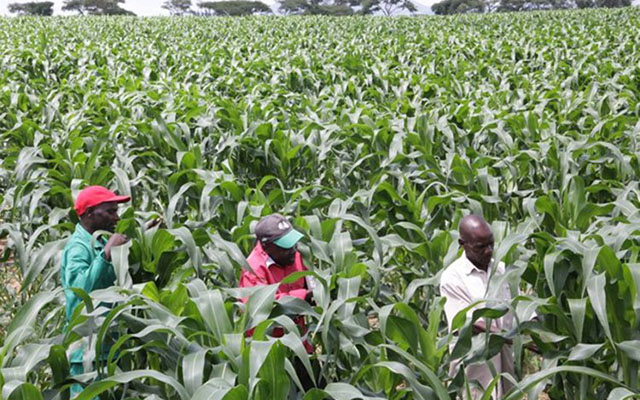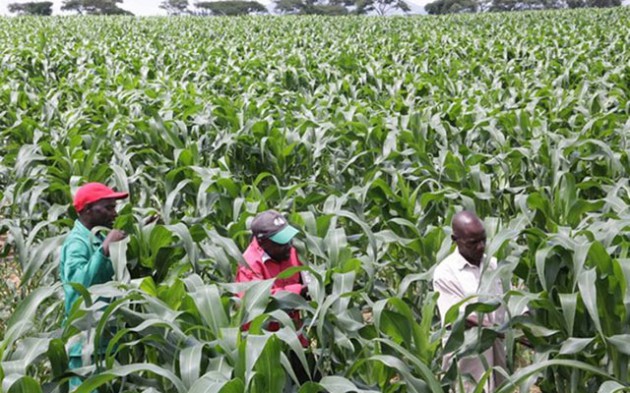What could it be if it’s not Command Agriculture!

 Sydney Kawadza Agriculture Focus
Sydney Kawadza Agriculture Focus
A story originating from international news agency, Reuters, crept into the pages of the local Press, ostensibly for its message; raising doubt on Government’s Command Agriculture Programme.
We are shouting high and above celebrating the success of the Command Agriculture programme, so it was not surprising that this piece claimed the Government initiative was costly.
In fact, for Reuters, their calculations (don’t really know how competent they are), indicated that Government subsidies through the Command Agriculture programme would increase the budget deficit by $120 million.
That figure is quite scary!
But there is really nothing to be scared of when one looks at global trends in as far as issues to do with food security are concerned.
I was really itching to hear what Finance and Economic Development Minister Patrick Chinamasa would say about these “calculations” but he has decided “to work rather than talk”.
However, it goes without saying that that story missed a lot of issues, especially when we look at why a Government would go to great lengths to “literally” bust the bank to fund agriculture.
A bit of historical background should help us build our case in support of this noble Government initiative. Scholar Giovanni Arighi states that even the Rhodesian government went out of its way to assist European farmers, who had come to occupy the fertile land between the Limpopo River to the South and Zambezi to the North.
The most important element determining the nature of economic and political development in Southern Rhodesia, he further states, was the British South Africa Company’s overestimation at the end of the 19th century of its mineral resources, and the persistence of this overestimation for roughly 15 years.
After this oversight, the Europeans, some of them who had arrived in Zimbabwe with literally “the clothes on their backs”, had to turn to agricultural production for both survival and economic purposes.
But how did they survive?
They introduced legislation to improve and/or enhance agricultural production among the food producing farmers who had become quite critical.
Among a litany of laws they enacted was the Maize Control Act of 1931, which was amended several times in order to protect whatever the white farmers produced.
The laws protected the farmers who had become so important that the colonial government went out of its way to ensure that agricultural production became key to the economic development of the country.
Lest we forget, the European farmers had no money of their own when they took to farming but relied on banks and such institutions as Agritex, Duly’s and Farmec.
However, the Rhodesian government also played a critical role in ensuring that production was guaranteed on the farms. A parliamentarian in the colonial government clearly revealed the role played by government to ensure productivity.
He states that the bank would, under the farmer’s name, buy inputs and equipment for agricultural input from providers such as Farmec, Duly’s, Windmill and other places.
Government would provide agricultural extension officers to help the farmer using the aforesaid inputs, he said. Farmers, he said, would not handle cash except delivery of produce to buyers such as the GMB, using vehicles and equipment bought for him from Duly’s and implements from Farmec.
Under the watchful eye of the extension officers, they would make sure the proceeds would be channelled to the farmer’s account at Barclays Bank or any other agricultural bank at the time.
The bank would then reinvest this money in the same operation. He revealed further that the farmers were only required to pay back this facility after four to six seasons and the farmers were assured of money for themselves, the bank and other support services.
Enough of history! But it indeed worked out great for the colonisers.
That however is not the point. The point remains the critical role played by Government to ensure that there is productivity on the farms.
In Europe and the United Kingdom, there is the Common Agricultural Policy, which subsidises production covering farming, environmental measures, rural development and the policies that control how Europe trades with other countries.
The EU spends 40 percent of its budget towards CAP. The UK reserves about four billion pounds of taxpayers money on agriculture annually on the policy.
The money is expected to prop up farming systems while shifting agriculture to more extensive, low-input farming that provides jobs in rural communities and safe, healthy food for the citizens.
If I may digress a bit, Zimbabwe Millers Association chairman Mr Tafadzwa Musarara talks of how the United States government protects its citizens from sharp increases of oil prices by carrying the extra costs.
So what is wrong when the Zimbabwe Government protects its citizens from potentially high food costs by bearing the costs of production when it’s all about food production?
The Command Agriculture programme, inasmuch as many would want to make it a political programme, was informed by the suffering, which Zimbabweans had to go through during years of drought.
Zimbabwe has for 17 years been reeling under difficult economic conditions, which have been made worse by sanctions imposed on the nation, coincidentally, over issues to do with land.
Land and food production are synonymous!
So Government, after committing itself to making sure that its indigenous people have a say on the production of food, thereby providing land, has not forgotten that there is also the need to make sure there is production.
As Women’s University of Africa lecturer Dr Innocent Mahiya asks, if not Command Agriculture, then what?
Those who are criticising Government’s efforts to ensure productivity should try to answer that!
However, it is imperative that Government builds on the success of the Command Agriculture programme to improve on the technical expertise given to farmers by Agritex officers and deal with the challenges that we faced as a nation this season.
Cognisant of the challenges associated with climate change, it is important that Government moves on to invest in irrigation equipment as a mitigatory measure against the possible adverse weather phenomena.
Zimbabwe has the required water bodies, hence the need to invest in irrigation equipment.
- Feedback: [email protected]









Comments